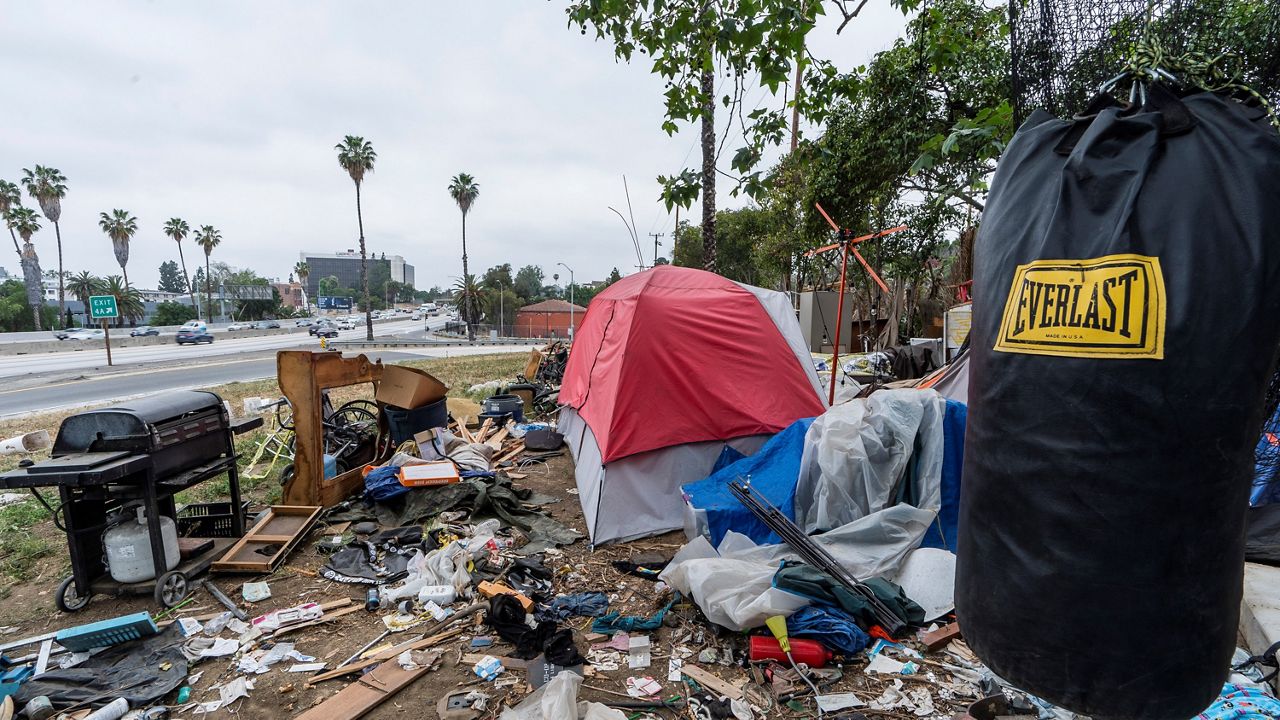PASADENA, Calif. (CNS) — Sunday is World Mental Health Day and one local homeless services agency is using the opportunity to shine a light on the need to destigmatize mental illness in the fight against homelessness.
Pasadena-based Union Station Homeless Services, the lead agency coordinating services in the San Gabriel Valley, has trained its employees on how to talk about mental health with its clients in a way that "normalizes" problems that have been a source of shame for some people.
"Now is the time to change the narrative and discussion around mental health," Union Station CEO Anne Miskey told City News Service. "We must reduce the stigmas and expand our understanding and empathy."
The World Health Organization is promoting world Mental Health Day as a way to acknowledge the toll the COVID-19 pandemic has taken on people's mental health over the last 18-plus months.
The WHO is advocating for mental health care for all and working to highlight how common mental illness is, as a way to persuade people that seeking help is not a sign of weakness.
That approach is central to Union Station's Mental Health First Aid training, Jacob Friedman, program manager at Union Station's Centennial Place in Pasadena, told City News Service.
"We live in a society that stigmatizes mental health and because of that, it tends to avoid mental health issues. The beauty of this training is that it gives people the tools to more comfortably discuss mental health problems, identify mental health issues early on and support people — preemptively rather than reactively," Friedman said.
When it comes to those experiencing or at risk of homelessness, the consequences of not seeking treatment for mental illness or substance abuse problems can be severe and life-changing.
The training aims to bring mental health concerns out in the open by following an action plan staffers call ALGEE:
- Assess for risk;
- Listen nonjudgmentally;
- Give advice;
- Encourage professional help, if needed; and
- Encourage self-help tools.
The case coordinators and other staffers at Centennial Place's 142-unit supportive housing complex and other Union Station facilities are not clinicians or registered nurses, so their goal is not to diagnose residents.
Instead, they use their training to make certain residents feel heard and gather enough information to refer them to the appropriate resources.
At Centennial Place, those resources include a clinician who offers on-site therapy for residents who face barriers in getting to a clinic, as well as referrals to Acadia Healthcare, Pacific Clients or other third-party providers.
One of Centennial's younger residents shared that he was feeling depressed and thinking about suicide some weeks ago. Someone without training might have tried to steer away from the topic, but Friedman said he has learned that's the wrong approach.
"Silence and avoidance is a statement in and of itself," Friedman said. "Acknowledging someone's feelings or behaviors can really go a long way in destigmatizing and breaking down the shame someone might have around those feelings."
Directly addressing the threat of suicide without hesitation led to the young man's sharing that he had a substance abuse problem that left him feeling helpless. Since enrolled in an outpatient treatment program, the man recently shared with Friedman that he has now been clean and sober for six weeks and feels more empowered to help himself.
Getting the right treatment resources in place is just one piece of the puzzle of solving homelessness. On Tuesday, the Los Angeles County Board of Supervisors approved a budget including $527 million in spending on a wide array of strategies ranging from street outreach and emergency shelter services to permanent supportive housing and job training opportunities.
Other initiatives have focused on preventative measures, like promoting and supporting more affordable housing or enforcing an eviction moratorium to try and keep people in their homes.
Union Station Homeless Services takes a similarly broad approach. It follows a "housing first" model. It is one of the only agencies to simultaneously offer six types of interim housing with wraparound services, including overnight stays on church property, motel vouchers, pallet shelters, motel conversions and congregate housing for both individuals and families.
"There are so many different individual reasons for falling into homelessness, we must offer a variety of solutions to meet the need," Miskey said.
Yet street outreach and assessment and access to mental health and substance abuse problems remain a priority, with the Los Angeles Homeless Services Authority estimating the incidence of mental illness within the homeless population at roughly 25% and a Los Angeles Times analysis of earlier LAHSA data pegging the number at more than 50%.
Pasadena residents seeking help for homeless individuals or anyone dealing with mental health problems can reach out to the Homeless Outreach Psychiatric Evaluation or HOPE team of professionals through their local police precinct. Other Los Angeles County residents can access a Department of Mental Health helpline at 800-854-7771.
More information on World Mental Health Day can be found at www.who.int/campaigns/world-mental-health-day/2021/about.
